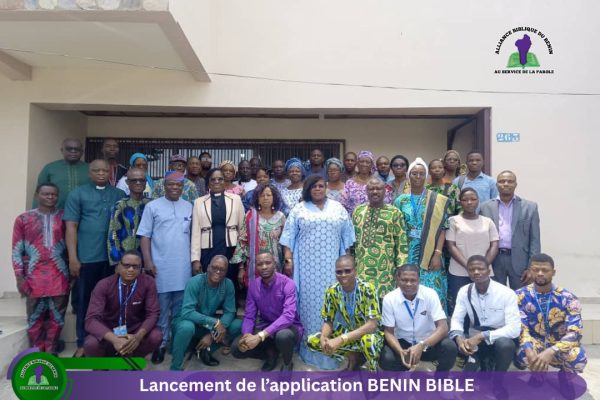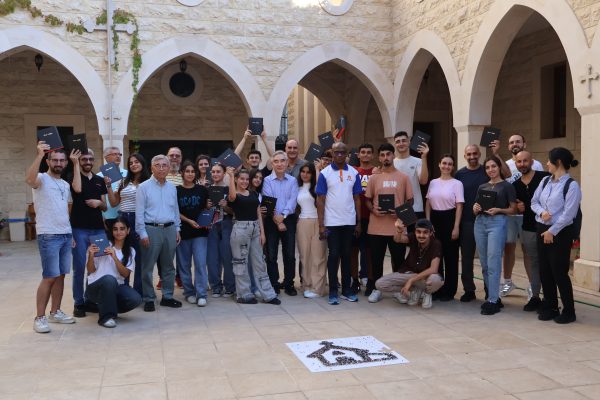
November 5, 2024
With contributions by Kjara Matija, Project Coordinator & Church Relations, Interconfessional Bible Society of Albania.
 The Board of the Interconfessional Bible Society of Albania (IBSA) recently visited the Vatican shortly after the conclusion of the Synodal Assembly convened by Pope Francis.
The Board of the Interconfessional Bible Society of Albania (IBSA) recently visited the Vatican shortly after the conclusion of the Synodal Assembly convened by Pope Francis.
The highlight of the visit was a meeting with Cardinal Kurt Koch, Prefect of the Dicastery for Promoting Christian Unity.
During the meeting, Cardinal Koch commended the Bible Society for its efforts in translating and distributing the Bible across Albania and for fostering cooperation among various churches. He also highlighted the global role of the United Bible Societies in advancing Christian unity.
The Board expressed appreciation for Cardinal Koch’s consistent support for Christian unity in Albania and recognized the Dicastery’s role in promoting collaborative efforts.
The Board also updated Cardinal Koch on current projects of the Bible Society, including the translation of the New Testament into Gheg and the Septuagint.
At the conclusion of the visit, the Board presented Cardinal Koch with two recent publications of the Bible Society: the new interconfessional translation of the Bible in Albanian and a facsimile edition of the 10th-century Codex of Korça, an important historical manuscript held in the State Archives of Albania. These publications highlight both the Bible Society’s longstanding dedication and the collaborative efforts of Albanian churches to make the Scriptures accessible and meaningful for the people of Albania.
Reflecting on this visit, Altin Hysi, the IBSA General Secretary, remarked: “Our time with Cardinal Koch was a profound reminder of the power of Scripture to unite us. His words of encouragement reaffirm our mission in Albania to make the Bible accessible and meaningful across all traditions. The unity fostered by this work is not only a testament to our dedication but also to the enduring strength and hope found within our shared faith.”

The Bible Society’s General Secretary also spoke on the importance of collaboration between the Christians and the churches in the context of Albania’s unique religious history and current landscape. He noted that the Bible Society provides a valuable platform for cooperation among Christians and churches at both leadership and grassroots levels. Through practical projects like Bible translation and Scripture engagement, the Bible Society serves as an important model of unity that could inspire the broader society, which the General Secretary described as “in need of such models.”
The delegation of the Interconfesional Bible Society of Albania includes:
- Board Chair, Monsignor Gjergj Meta, Catholic Bishop
- His Grace Bishop Nikolla, Orthodox Bishop
- Father Spiro Topanxha, Orthodox Priest
- Mr Nathan Hoppe, Theologian from the Orthodox Church
- Mr Frank Nikolla, from the Catholic Church
- Mr Gjergj Ndoci, from Evangelical Church
- Mr Altin Hysi, General Secretary of Interconfessional of the Bible Society of Albania
About Albania
The Interconfessional Bible Society of Albania has been active in Albania since 1996, working within the context of a country marked by economic challenges. Albania holds significant geo-religious importance due to its distinctive blend of religious diversity and its complex history.
With a population of around 2.6 million, Albania has a Muslim majority, followed by Christian communities. Islam is the most widely practised religion, though Christianity also has deep historical roots in the region. Christianity was introduced as early as apostolic times, while Islam spread more widely during the period of Ottoman rule.
Religiously, Albania is regionally divided, with Sunni Muslims predominating in the north and Bektashi Muslims mainly in the south. Roman Catholics are primarily located in the northern regions, while Eastern Orthodox Christians are largely found in the south.
According to the 2023 census, 51% of the population identifies as Muslim (including Sunni, Bektashi, and non-denominational Muslims), while 16% identify as Christian (including Catholics, Orthodox, and Evangelicals). Additionally, 17% of Albanians identify as irreligious (including atheists and non-religious), while 16% do not declare a religious affiliation.
Throughout its history, Albania has faced periods of intense religious persecution, from the Ottoman Empire to the Communist regime, which has influenced its current religious landscape. This history, coupled with Albania’s unique religious diversity, makes the work of the Interconfessional Bible Society particularly relevant and impactful in promoting unity and cooperation among various faith communities.













